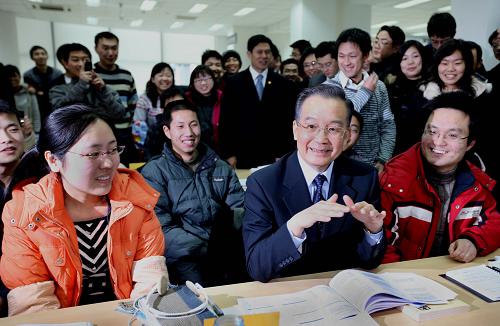 |
|
Premier Wen Jiabao (C front row) talks to students at the Beijing University of Aeronautics and Astronautics, China, on Dec. 20, 2008. Wen arrived in the university's library and chatted with students there on Saturday after attending the closing ceremony of a year-long exchange program between Chinese and Japanese young people. |
College graduates' employment is on top of the government's agenda, Premier Wen Jiabao told students at a Beijing university on Saturday.
The students present in the Beijing University of Aeronautics and Aerospace's library greeted his announcement with cheers.
"Your difficulties are my difficulties, and if you are worried then I am more worried than you," Wen said.
He a surprise visit to the university at the end of a yearlong youth exchange program between China and Japan.
The government is determined to help 6.5 million graduates find jobs next year amid the global financial crisis, which has made many job hunters pessimistic.
A Chinese Academy of Social Sciences report, issued last week, said a quarter of China's college graduates would have difficulty finding a job next year.
But Wen said: "Students, please rest at ease, we are putting the problem of graduates' employment on top of our agenda."
"We're most worried about two issues (created by the global financial crisis). One is of migrant workers returning home, and the other of jobs for graduates," he said.
The government will try to create 9 million jobs next year, based on an 8 percent GDP growth, Wen said.
All the 6.5 million students expected to graduate next year are covered by the plan.
The government will work on a policy package to stimulate major scientific research projects and large enterprises to create jobs for graduates, he said.
Some graduates will be encouraged to work for research programs in their universities, too, and relevant ministries asked to make the procedure smooth, he said.
The State Council issued a directive on Saturday, too, asking companies to avoid large-scale lay-offs and solve any labor disputes, especially those over pay, on a priority basis.
Many migrant workers have returned home after being fired by companies, a number of which have suffered a lot because of falling demands overseas.
"Companies that down shutters or go bankrupt must strictly follow the law, and owners who unnecessarily hold back wages or run off without paying workers will be firmly dealt with," reads the directive issued by the country's Cabinet.
China-Japan friendship
Before visiting the library, Wen and former Japanese prime minister Yasuo Fukuda joined 2,008 youths from China and Japan at the university gym for the closing ceremony of the China-Japan Youth Friendly Exchange Year.
Wen and Fukuda had decided to hold the program when they met in Singapore last year.
"The activity was organized very well such exchanges will be sown in the hearts of the young generation as seeds and will be reaped in the future," Wen told Fukuda during their half-hour meeting before the closing ceremony.
Under the program, more than 12,000 youth from China and Japan, triple the number of the original target, visited each other's country after President Hu Jintao launched it in Beijing in March.
The program, which coincided with the 30th anniversary of the signing of the China-Japan Peace and Friendship Treaty, makes "the exchange all the more significant", Wen said.
As a finale to the program, a 1,000-member Japanese delegation, ranging from students to parliamentarians and businessmen, is on a weeklong visit to China.
The program will continue for the next three years, with 4,000 people exchanging visits each year.
(China Daily December 22, 2008)